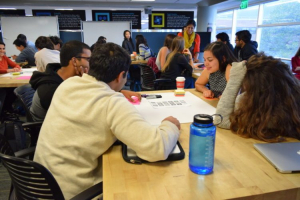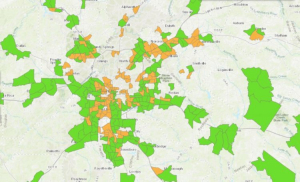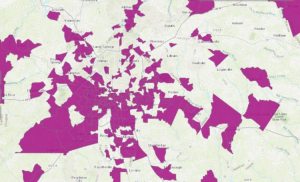By David Pendered
February 20, 2018
An affiliate of the United Nations has recognized a new Regional Center of Expertise in metro Atlanta as just the sixth such regional sustainability network in the United States. The RCE Greater Atlanta aims to advance education for sustainable development related to the U.N. Sustainable Development Goals, through smart sharing of information and collaborative programming among universities, governments, communities and the private sector.

One way to fathom RCE Greater Atlanta is as a much larger version of the Atlanta City Design Project. The design project aims to knit together a vast array of inputs about how the city can accommodate growth, and provide for the growth to contribute to the quality of life in the city.
Likewise, the purpose of the RCE Greater Atlanta is to combine the strengths of academic research with those of government and the private sector across the region, to include the University of Georgia, in Athens. The objective is to develop – and implement – strategies to enable the region to provide a positive quality of life for a regional population the Atlanta Regional Commission expects to grow by 37 percent by 2040.
Rutherford Seydel, an Atlanta-based international environmentalist, wrote a letter of support on May 23, 2017 for the Atlanta RCE application that outlined his perspective on what the organization could achieve in metro Atlanta:
- “The proposed Greater Atlanta RCE will solidify what has already begun organically in the Atlanta area. Business owners, university leaders, and non-governmental organizations have been convening for months to collaborate and leverage networks in the interest of sustainability. The passion for, subject matter experience in, and commitment to the United Nation’s Sustainable Development Goals is present in Atlanta, and I urge you to further this movement by approving the request for a Greater Atlanta Area RCE.”

The RCE Greater Atlanta was recognized Feb. 1 by the Tokyo-based United Nations University Institute for the Advanced Study of Sustainability. The institute identifies 158 RCEs worldwide. RCEs approved this month, including Greater Atlanta, are to be added to the website in March. The five other RCEs in the United States are located in Georgetown, Grand Rapids, Greater Burlington, Greater Portland and the Shenandoah Valley.
Tech announced the recognition Feb. 16.
“We expect it to facilitate important university-community partnerships that will benefit students, faculty and the region as a whole and make Greater Atlanta a leader in education for sustainable development,” Jennifer Hirsch, director of Georgia Tech’s Center for Serve-Learn-Sustain, said in a statement. “Being a part of a global network of RCEs will also keep us on the cutting edge of sustainability innovation.”
Three academic institutions are to lead the RCE for the first two years: Georgia Tech, Emory University and Spelman College.
The other academic partners include Agnes Scott College, Atlanta Metropolitan State College, Clark Atlanta University, Georgia State University, Kennesaw State University, Morehouse College and University of Georgia.
The list of partners is the veritable “Who’s Who” of sustainability efforts in the region – plus partners working on other issues related to the U.N. SDGs. These other issues may not be though of as related to sustainability, but are viewed as crucial components of the effort to create a sustainable region.
Partners who submitted letters of support for the application include the Atlanta Regional Commission, Captain Planet Foundation, Center for Sustainable Communities, City of Atlanta, Corporate Volunteer Council, Greenhouse Accelerator Inc., Ray C. Anderson Foundation, Saving Our Sons & Sisters International, Southface, and the United Nations Foundation.

